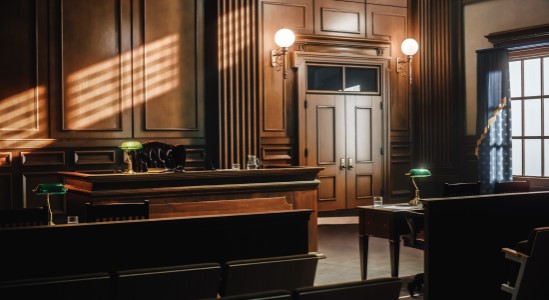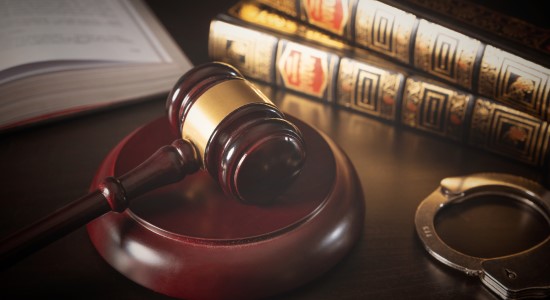Justice System Funding

Wisconsin's courts have constitutional functions and obligations that require sufficient funding to meet those responsibilities. Since the legislature has the constitutional power to tax, the judiciary is dependent on the other branches of government, especially the legislature, to provide adequate funding to perform its constitutional duties.
The State Bar of Wisconsin Board of Governors (BOG) believe that adequate funding of the judicial branch of government is of critical importance to provide a system of justice which is fairly administered and impartial to all people, regardless of financial circumstance.
Prosecutor and State Public Defender Funding and Caseload Standards - Overworked prosecutors and public defenders are forced by too-high caseloads to cut corners in their representation of the public or their clients. The integrity of the justice system requires that litigants be fairly and effectively represented regardless of economic resources. The State Bar BOG supports adequate funding for all state prosecutors and state public defenders to ensure both effective representation of the public in criminal cases and ethical, effective representation for each defendant. The BOG supports compensation (including benefit packages) that is adequate to attract and retain experienced and talented public defenders and prosecutors. The BOG also supports caseload standards for attorneys based upon objective standards recognized by the American Bar Association.
Judicial Compensation - The Judicial Branch is a co-equal branch of government and should have the ability through an independent Judicial Compensation Commission to set judicial salaries at an equitable level that properly compensates the work of the judiciary, allowing courts to attract and retain judges capable of administering justice fairly and efficiently.
Compensation for State Attorneys - The State Bar BOG supports compensation adequate to attract and retain experienced and qualified attorneys employed by the State of Wisconsin.
Court Operations - The State Bar of Wisconsin BOG fundamentally believes the Judicial Branch of government should be funded through sum-sufficient general purpose revenue. The State Bar BOG supports funding for all areas of court operations and court personnel, such as: law libraries, deputy and assistant clerks of court, secretaries, law clerks, court interpreters, and court commissioners. The State Bar BOG also believes increases in filing fees make access to justice very difficult, but, any increase in filing fees must go to support the justice system.
New Circuit Court Branches - The State Bar BOG supports increases in Circuit Court branches after an analysis of caseload standards demonstrates that the Circuit Court needs a new branch.
Department of Justice Funding - The State Bar BOG supports adequate funding for the Wisconsin Department of Justice to ensure that it can maintain its responsibilities to support the legal community and the justice system in order to ensure the protection of Wisconsin's citizens.
Judicial Council - The State Bar BOG supports the funding of the Judicial Council. The 21-member statutory body studies and makes recommendations relating to: (1) court pleading, practice and procedure and (2) organization, jurisdiction and methods of administration and operation of Wisconsin courts. In order to carry out these statutory responsibilities the Judicial Council needs state support to assist these important functions to advance our judicial system.
Private Bar Compensation

The U.S. Constitution (Sixth Amendment) and the Wisconsin Constitution (Art. I, Section 7) guarantee that all criminal defendants have a right to effective assistance of counsel. States must provide a lawyer to indigent defendants who can't afford one.
All states have some form of public defender system to handle these appointments. The State Public Defender Office (SPD) is a state agency with full-time staff attorneys in 40 offices throughout Wisconsin.
Private bar appointments are necessary when SPD attorneys are overloaded or conflicts exist. In recent history, the SPD has often been underfunded, leading to a severe shortage of private bar attorneys willing to take public defense cases.
The lack of private bar attorneys in certain areas of the state has caused case delays and postponements, inconveniencing victims and police officers and increasing county jail stays and local expenses. Low reimbursement rates can push private bar attorneys away from taking cases, especially when those rates are inadequate to cover an attorney's full operating costs which often include office costs, staff, and other business expenses.
Beginning January 2020, for the first time since 1995, the private bar rate was increased from $40 to $70 per hour, plus $25 per hour for travel time. In July 2023, the private bar was again increased to $100 per hour, with $50 per hour for travel time. These increases have helped to grow the number of attorneys taking SPD appointments, but time and inflation will continue to be a factor on how many are willing to do so moving forward.
Our Role
In order to give defendants the representation they both need and deserve, the State Bar BOG supports state funding for private practice lawyers' compensation for defense appointments at a rate that fairly compensates lawyers for their time, travel and any other costs associated with providing quality representation to their clients. Rates of compensation should be at least as much as those set by the Wisconsin Supreme Court for court-appointed attorneys, as anything less will not safeguard the constitutional rights of individuals accused of committing a crime. Reimbursements should be timely to ensure a more efficient and effective criminal justice system.
The State Bar BOG believes that if the state invests in private bar rates to an acceptable and adequate level, the pool of qualified attorneys willing to take private bar cases would increase and the efficiency in appointing cases would also improve. Delays in our court system would decrease, costly appeals might be avoided and fewer victims would be re-victimized by drawn out legal proceedings.
